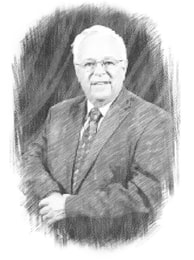II Corinthians 5
II Corinthians 5:1-6:
For we know that if our earthly house, this tent, is destroyed, we have a building from God, a house not made with hands, eternal in the heavens.
2 For in this we groan, earnestly desiring to be clothed with our habitation which is from heaven,
3 if indeed, having been clothed, we shall not be found naked.
4 For we who are in this tent groan, being burdened, not because we want to be unclothed, but further clothed, that mortality may be swallowed up by life.
5 Now He who has prepared us for this very thing is God, who also has given us the Spirit as a guarantee.
6 So we are always confident, knowing that while we are at home in the body we are absent from the Lord.
For we know that if our earthly house, this tent, is destroyed, we have a building from God, a house not made with hands, eternal in the heavens.
2 For in this we groan, earnestly desiring to be clothed with our habitation which is from heaven,
3 if indeed, having been clothed, we shall not be found naked.
4 For we who are in this tent groan, being burdened, not because we want to be unclothed, but further clothed, that mortality may be swallowed up by life.
5 Now He who has prepared us for this very thing is God, who also has given us the Spirit as a guarantee.
6 So we are always confident, knowing that while we are at home in the body we are absent from the Lord.
|
II Corinthians 5:7:
For we walk by faith, not by sight. |
So, circumstances may not look so good and promising, but God is still worthy of all the thanks and all the praise. |
 William Bridge
William Bridge
“We do not live by feeling, but by faith: it is the duty of a Christian to begin with faith, and so to rise up to feeling: you would begin with feeling, and so come down to faith; but you must begin with faith, and so rise up to feeling. And I pray tell me, is it not sufficient to be as our Master was? Did not Christ want the sense of God's love, when he said, "My God, my God, why hast thou forsaken me?" Yea, had not Christ the sense of God's anger upon him when he did perform the greatest act of obedience that ever the sun saw: yet did he then say, I am not the child of God, because I want the sense of God's love, because I am under the sense of God's anger? No, but with the same breath that he said he was forsaken, he said, "My God, my God;" and at the same time he called God Father, "Father, forgive them," &c. So may you do; though God hath forsaken you, though you want the sense of his love, yea, and are under the sense of God's anger; yet at the same time you may say, The Lord is my Father, and you may go to him as your Father: and if you can say, God is my Father, have you any reason for your discouragements?”
― William Bridge, A Lifting Up for the Downcast
― William Bridge, A Lifting Up for the Downcast
|
II Corinthians 5:9-13:
Therefore we make it our aim, whether present or absent, to be well pleasing to Him. 10 For we must all appear before the judgment seat of Christ, that each one may receive the things done in the body, according to what he has done, whether good or bad. 11 Knowing, therefore, the terror of the Lord, we persuade men; but we are well known to God, and I also trust are well known in your consciences. 12 For we do not commend ourselves again to you, but give you opportunity to boast on our behalf, that you may have an answer for those who boast in appearance and not in heart. 13 For if we are beside ourselves, it is for God; or if we are of sound mind, it is for you |

In the classic verse John 15:5, we find Jesus proclaiming the simplest of instructions on how to be rooted in the right things. It’s not material possessions; it isn’t having an abundance of friends or never being alone; and it definitely isn’t found in the consumption of ridiculous substances. All that leaves us empty, yet the only way is to abide and be rooted in Him. “I am the vine; you are the branches. If a man remains in me and I in him, he will bear much fruit; apart from me you can do nothing.”
But Jesus doesn’t end it there. In our Western culture, we see this passage strictly in the personal and don’t apply it corporately. John 15 paints the picture of a vine, grafted into a vineyard, where together the vines produce a harvest, not just a few grapes. That is the power of connection. That is the power of the true family of God, working together to produce fruit empowered by the Holy Spirit. Only then will we feel a sense of true belonging, being rooted in something other than ourselves. -DANIEL PARKINS; Relevant Magazine 2 Corinthians 5:10 says we will be rewarded according to whether our deeds on earth have been “good” or “bad.” The Greek word used for “bad” is “phaulos” and it means worthless. Our judgement is based on whether our deeds for Christ were good or worthless. These deeds or actions are not to be accomplished by human strength or the fruit of man’s glory but on the unction of the Holy Spirit. |

God’s glory and holiness call for our worship and submission. When people in Scripture encountered God, they instinctively demonstrated a deep reverence for Him. We can learn from these examples in our quest to fear God as we should.
The thought of God’s judgments on sin should strike fear into every heart:
The thought of God’s judgments on sin should strike fear into every heart:
- David used strong language to describe God’s judgments. “Thy fierce wrath goeth over me; thy terrors have cut me off” (Psalm 88:16).
- The Apostle Paul spoke of God’s judgment as a motivation to preach the Gospel. “For we must all appear before the judgment seat of Christ; that every one may receive the things done in his body, according to that he hath done, whether it be good or bad. Knowing therefore the terror of the Lord, we persuade men . . .” (II Corinthians 5:10–11). -Institute in Basic Life
|
II Corinthians 5:14-16:
14 For the love of Christ compels us, because we judge thus: that if One died for all, then all died; 15 and He died for all, that those who live should live no longer for themselves, but for Him who died for them and rose again. 16 Therefore, from now on, we regard no one according to the flesh. Even though we have known Christ according to the flesh, yet now we know Him thus no longer. |
“You have searched for me and known me. You know my sitting down and my rising up; You understand my thoughts afar off. You comprehend my path and my lying down, and are acquainted with all my ways.” (Psalm 139:1-3, NKJV) |
 Neil T Anderson
Neil T Anderson
In our culture we have a tendency to derive our identity from the things we do, and we identify one another by our physical bodies. That would be necessary if we were only natural people. Asd children of God, however, we have a whole new identity: Therefore, from now on we recognize no man according to the flesh" (2 Corinthians 5:16).
-Neil T Anderson; Overcoming Addictive Behavior; [c]2003
-Neil T Anderson; Overcoming Addictive Behavior; [c]2003
 Tom Ascol
Tom Ascol
The Lord does not treat only our symptoms. He addresses the root cause of all our problems. By the power of His Spirit and His Word, He changes us so that we become “new creations” (2 Cor. 5:17).
Sin is not yet purged from the Christian’s heart, though one day it will be. But its power is broken so that, by faith in Christ, we can pursue real holiness from the inside out.
-Tom Ascol; Founders Ministries
 AW Tozer
AW Tozer
"The old cross is a symbol of death. It stands for the abrupt, violent end of a human being. The man in Roman times who took up his cross and started down the road had already said goodbye to his friends. He was not coming back. He was going out to have it ended. The cross made no compromise, modified nothing, spared nothing, it slew all of the man, completely and for good. It does not try to keep on good terms with its victim. It struck cruel and hard, and when it has finished its work, the man was no more."
– as cited in "Warren Wiersbe, the Best of AW Tozer."
– as cited in "Warren Wiersbe, the Best of AW Tozer."
 Steve Gallagher Files
Steve Gallagher Files
A revolution must take place before a person will hate his sin. A new King must be inaugurated. The old kingdom, under the reign of self, must be toppled. The person who becomes a follower of Christ and attempts to maintain control over his own life has noit submitted himself to the lordship of Jesus Christ. All this person can ever hope for is to abstain from besetting sin. On the other hand, the man who has allowed God to break down self rule, has a whole new set of values infused into his being. This is what Paul was referring to when he said "Therefore if any man be in Christ, he is a new creature: old things are passed away; behold all things are become new," (II Cor 5:17). He gave a fuller version of what he was expressing in his letter to the Ephesian church: "This I say therefore, and affirm together with the Lord, that you walk no longer as the Gentiles also walk, in the futility of their mind, being darkened in their understanding excluded from the life of God, because of the ignorance that is in them, because of the hardness of their heart; and they, having become callous, have given themselves over to sensuality, for the practice of every kind of impurity with greediness. But you did not learn Christ in this way, if indeed you have heard Him and have been taught in Him, just as truth is in Jesus, that, in reference to your former manner of life, you lay aside the old self, which is being corrupted in accordance with the lusts of deceit, and that you be renewed in the spirit of your mind, and put on the new self, which in the likeness of God has been created in the righteousness and holiness of the truth (Eph 4:17-24). --Steve Gallagher; At The Altar of Sexual Idolatry
As I thought more and more about my identity, not only as a Christian, but a black man in America, I reached the following conclusion while looking through the lens of scripture.
I believe scripture shows that our ethnicity should no longer be a focal point when we are born again. We have a new identity. I am not a black Christian, but a Christian housed in a black body. My nature has changed. I am a child of God. - Rubin E Grant
I believe scripture shows that our ethnicity should no longer be a focal point when we are born again. We have a new identity. I am not a black Christian, but a Christian housed in a black body. My nature has changed. I am a child of God. - Rubin E Grant
The New Testament scripture that declares the most about reconciliation is 2 Corinthians 5:17 -21. The Apostle Paul clearly teaches that a believer can be a “new creation” in Christ through reconciliation. God sent Christ into the world to provide reconciliation through His death.
Reconciliation provided justification “For He made Him who knew no sin to be sin for us, that we might become the righteousness of God in Him.” Because a believer is righteous in God’s sight, he can have a wonderful and new relationship with God in fellowship. The Apostle Paul tells Believers that they are “ambassadors for Christ” and commissions them to implore people to be reconciled to God. This is the mission of the church. We are to implore sinners in Christ’s behalf to be reconciled to God. -Gary M Barker
Our works do not save us but saving faith will bring a change in our hearts. With the Holy Spirit living within us, we have a desire in our heart to live righteously and serve God (Ephesians 2:8-10; 2 Corinthians 5:17; Colossians 3:10; Ephesians 4:24).
Reconciliation provided justification “For He made Him who knew no sin to be sin for us, that we might become the righteousness of God in Him.” Because a believer is righteous in God’s sight, he can have a wonderful and new relationship with God in fellowship. The Apostle Paul tells Believers that they are “ambassadors for Christ” and commissions them to implore people to be reconciled to God. This is the mission of the church. We are to implore sinners in Christ’s behalf to be reconciled to God. -Gary M Barker
Our works do not save us but saving faith will bring a change in our hearts. With the Holy Spirit living within us, we have a desire in our heart to live righteously and serve God (Ephesians 2:8-10; 2 Corinthians 5:17; Colossians 3:10; Ephesians 4:24).
|
II Corinthians 5:18-21:
Now all things are of God, who has reconciled us to Himself through Jesus Christ, and has given us the ministry of reconciliation, 19 that is, that God was in Christ reconciling the world to Himself, not imputing their trespasses to them, and has committed to us the word of reconciliation. 20 Now then, we are ambassadors for Christ, as though God were pleading through us: we implore you on Christ’s behalf, be reconciled to God. 21 For He made Him who knew no sin to be sin for us, that we might become the righteousness of God in Him. |
Nov 17, 2022: Relevant: 15 Things Christians Should Stop Doing on Social Media
What you do and say on social media actually matters. While many Christians carry themselves with kindness and grace at church, once they tap that social media app they transform into some kind of snarling beast. Christians are called to be Christ’s ambassadors: “Therefore, we are ambassadors for Christ, God making his appeal through us” (2 Corinthians 5:20). But for some reason on Instagram, Facebook, and Twitter, many times, it seems like Christ is completely absent from our minds. Here are some tips to help us better represent Christ online — by addressing common pitfalls of Christians on social media: image, attitude, discernment, distractions and nastiness. |
 Jack Wellman
Jack Wellman
When I was witnessing to a stranger the other day, he was convinced that he was a pretty good person, but compared to whom? Compared to his own ideas of what is good and what is bad. God’s idea is that we need to be perfect, having the required righteousness of Christ. I reminded him that none of us are really good, not even one of us (Rom. 3:10); it’s just that we’ve been forgiven by a very good God. He said, “Well, at least I’m not a murderer,” but I told him that each of us will have to stand and give an account for what we’ve done in this life (Rom. 14:12; 1 Cor. 5:10) and that God will not say, “Well, compared to your neighbor there, you’re a pretty good guy.” No, we will stand alone, and God won’t say, “Okay, I’ll wait until you find someone who’s worse than you and then judge you according to how bad they are.” Try that in a court of law. I can guarantee that it won’t work.
Paul said that not only is it foolish to compare ourselves with others, but we dare not even try to classify ourselves in a certain standing before God based upon what we think (2 Cor. 10:12a). Jesus said that we must be perfect as our heavenly Father is perfect (Matt. 5:48) and that our righteousness must exceed that of the Pharisees (Matt. 5:20), so that presents a problem. Nothing sinful or imperfect can even enter heaven (Rev. 21:27). We must compare ourselves to the model of Christ and not others, and that’s a pretty high bar to reach, but there is a solution. For those who have repented and trusted in Christ, they will be seen as having the same righteousness as Christ (2 Cor. 5:21). Problem solved. - Jack Wellman; Rhetorical Jesus; Do You Compare Your Life To People Around You, or to Me? 10.8.23
Paul said that not only is it foolish to compare ourselves with others, but we dare not even try to classify ourselves in a certain standing before God based upon what we think (2 Cor. 10:12a). Jesus said that we must be perfect as our heavenly Father is perfect (Matt. 5:48) and that our righteousness must exceed that of the Pharisees (Matt. 5:20), so that presents a problem. Nothing sinful or imperfect can even enter heaven (Rev. 21:27). We must compare ourselves to the model of Christ and not others, and that’s a pretty high bar to reach, but there is a solution. For those who have repented and trusted in Christ, they will be seen as having the same righteousness as Christ (2 Cor. 5:21). Problem solved. - Jack Wellman; Rhetorical Jesus; Do You Compare Your Life To People Around You, or to Me? 10.8.23
 Leon Morris
Leon Morris
There is never the slightest hint in the New Testament that reconciliation can be brought about by what we do. We created the barrier that separates us from God (and from one another), but we cannot break it down. There are theologians who stress the element of human responsibility in such a way as to indicate that man brought about the alienation from God and that man can and should end it. On this view God’s attitude was always the same. He has always loved us and he is simply waiting for us to return to him. As soon as we do, reconciliation is effected.
But this is not what the New Testament is saying. The New Testament insists that something must be done about sin. It is not possible simply to ignore it, to count it as something that never happened. It did happen. Its results are with us. It has established a continuing enmity. For reconciliation to take place that enmity must be dealt with. And Paul emphasizes that this is what Christ did. Under this figure it is not said how the death of Christ put away sin, but it is said emphatically that is does. In redemption this is seen by way of paying the price, in justification by the bearing of penalty, and so on. There is no equivalent in reconciliation. But this way of looking at the atonement takes it that whatever had to be done was done. The important thing was the removal of the cause of the enmity and when Christ died on the cross he removed it.
This is something that he alone could do. Man is so immersed in sin that he does not even make the motion of wanting to leave it, let alone to do away with it. And even if he wanted to it is so big a task that it is more than he can accomplish. It is beyond him. But it is not beyond Christ. It is the measure of his greatness that he was able to accomplish this great task and he did. ‘He is our peace.’
--The Atonement: It’s Meaning and Significance by Leon Morris, page 148-149
But this is not what the New Testament is saying. The New Testament insists that something must be done about sin. It is not possible simply to ignore it, to count it as something that never happened. It did happen. Its results are with us. It has established a continuing enmity. For reconciliation to take place that enmity must be dealt with. And Paul emphasizes that this is what Christ did. Under this figure it is not said how the death of Christ put away sin, but it is said emphatically that is does. In redemption this is seen by way of paying the price, in justification by the bearing of penalty, and so on. There is no equivalent in reconciliation. But this way of looking at the atonement takes it that whatever had to be done was done. The important thing was the removal of the cause of the enmity and when Christ died on the cross he removed it.
This is something that he alone could do. Man is so immersed in sin that he does not even make the motion of wanting to leave it, let alone to do away with it. And even if he wanted to it is so big a task that it is more than he can accomplish. It is beyond him. But it is not beyond Christ. It is the measure of his greatness that he was able to accomplish this great task and he did. ‘He is our peace.’
--The Atonement: It’s Meaning and Significance by Leon Morris, page 148-149
|
Imagine utilizing the name of Jesus as if you have a signed document giving you power of attorney. As a Kingdom citizen, you have the right to act on Jesus’s behalf on the earth since he is no longer here physically. You are his representative (II Corinthians 5:20). You have the power and authority to be who he was on the earth, to say what he said, and to do what he did and even greater works (John 14:12). - Doral Pulley
|
What wonderful unlimited merit that God has given the righteousness of Christ to those who know Him (II Corinthians 5:17-21). One day we will sinlessly stand before Him in our bodies that have been made pure and holy, praising with no reservations to the Lamb of God, the King of Kings, and Lord of Lords! Even so, come quickly Lord Jesus ! -Mac Walls
|
 Neil T Anderson
Neil T Anderson
Paul argued that if death has no mastery over us, then neither does sin. "The death he died, he died to sin once and for all; but the life he lives, he lives to God" (Rom 6:10). This was accomplished when "God made him who had no sin to be sin for us, so that in him we might become the righteousness of Gods" (II Cor 5:21). When Jesus went to the cross, all the sins of the world were on Him. When the spikes were nailed into His hands and feet, He carried the weight of all our sins. But when He was resurrected, there was not a single sin on Him. As He sits at the right hand of the Father, there are not any sins on Him. He has triumphed over sin and death. He died to sin once and for all. -Neil T Anderson; Overcoming Addictive Behavior; [c]2003
 Jim Denison
Jim Denison
America’s Christians therefore have a vital and urgent task. We are watchmen on the wall, warning those inside the city of impending danger (Ezekiel 3:17–21). We are intercessors called to represent our people before God (1 Timothy 2:1–2) and ambassadors called to represent God before our people (2 Corinthians 5:20). We are the only salt and light in a world decaying in the dark (Matthew 5:13–16). We are the body of Christ, the visible manifestation of Jesus’ continuing ministry in our day (1 Corinthians 12:27). -Jim Denison; Denison Forum; Pastor tackles armed suspect during church service: A Veterans Day reflection; 11.11.21









